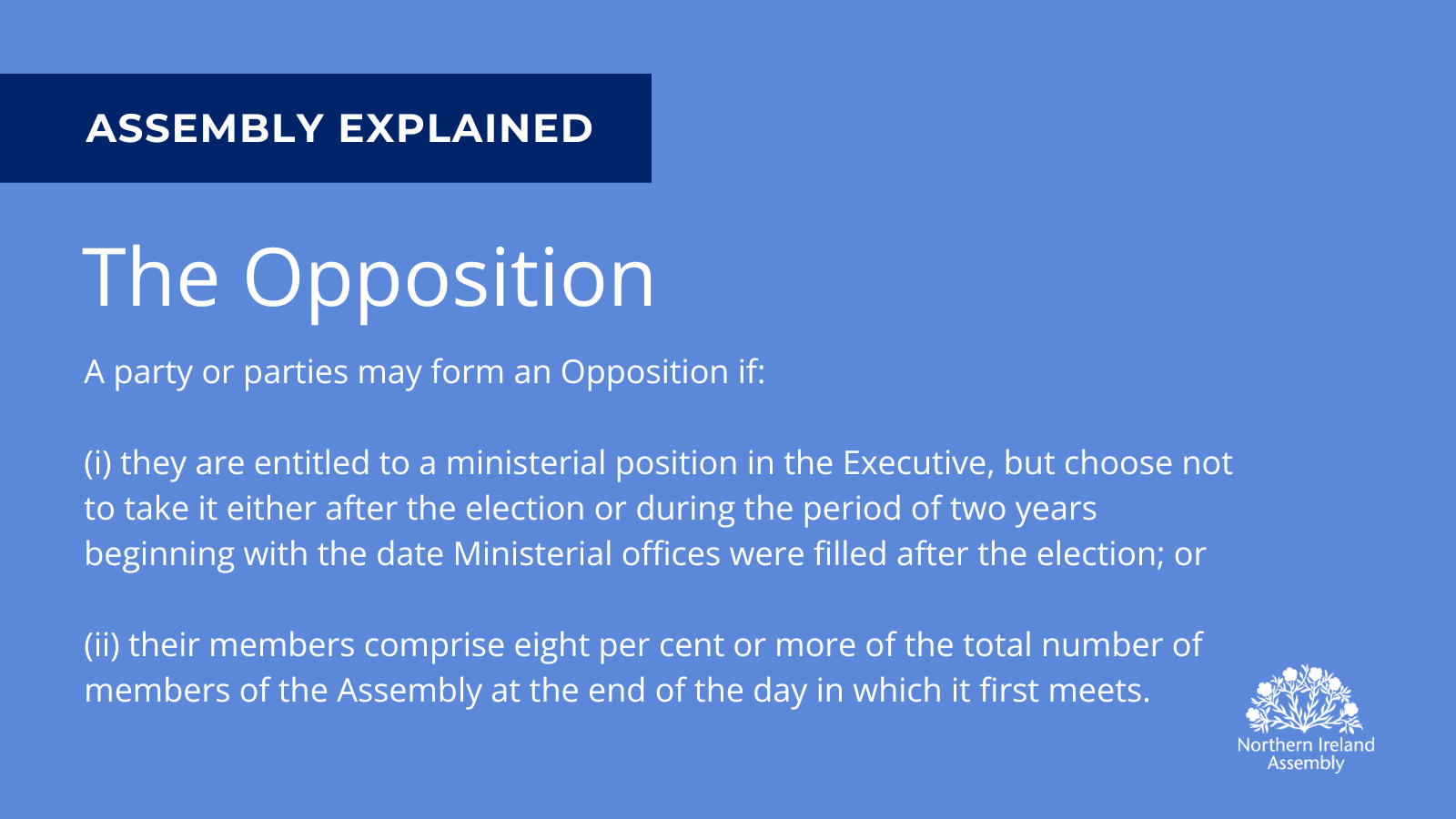Holding Power to Account: The Opposition in the Northern Ireland Assembly
Why we have an Opposition in the Assembly
When the Northern Ireland Assembly was established in 1998, it was on the basis of inclusive power-sharing, ensuring that all parts of the community were represented in government.
However, the Stormont House Agreement (2014) and A Fresh Start: The Stormont Agreement and Implementation Plan (2015) (A Fresh Start) made arrangements to enable those parties that would be entitled to ministerial positions in the Executive, but who choose not to take them, to be recognised as an official opposition and to facilitate their work. These arrangements included provision for financial and research assistance and designated speaking rights, set out in Section F of A Fresh Start agreement: Statement of Proposed Entitlements for an Official Opposition.
The Assembly agreed new Standing Orders on March 14, 2016. These changes included recognising an opposition, allowing the first Topical Question to a Minister from the opposition, and creating a new business category called Opposition Business. The provision for the formation of an opposition was also put into law in 2016, when the Assembly and Executive Reform (Assembly Opposition) Act (Northern Ireland) was passed. There are similarities and differences on entitlements for an opposition between the act and “A Fresh Start” agreement. The act allowed any party with at least 8 per cent of the total number of members of the Assembly and no Ministers to form an opposition. The act gave the opposition leadership official titles and required that Standing Orders include provision for enhanced speaking rights, the right to chair the Public Accounts Committee and membership of the Business Committee.
How the Opposition will operate in the Assembly
Following the 2020 political agreement New Decade, New Approach (NDNA), the Assembly and Executive Review Committee (AERC) commissioned an Independent Review into the adequacy and effectiveness of the Statement of Entitlements for an Official Opposition. When the AERC report was agreed by the Assembly, the Procedures Committee set about reviewing the relevant Standing Orders and proposed changes to the Assembly for cross-community approval.
As a result, a party can enter the opposition up to two years following the formation of an Executive (rather than when d’Hondt is run after the election). D’Hondt is the method that allows these leadership positions to be allocated proportionately according to the number of seats that each party won in the Assembly election
Read our article on "Understanding d'Hondt and its use in the Northern Ireland Assembly”
The opposition can now be made of a party or parties that would be entitled to ministerial positions in the Executive but choose not to take them up. Or a party or parties whose members comprise eight percent or more of the total number of members of the Assembly, at the end of the first day the Assembly meets.
Who leads the Opposition?
Where only one party is recognised as the opposition, that party must nominate a member to become Leader of the Opposition.
Where two or more parties form the opposition, the largest party must nominate a member to become Leader of the Opposition and the second largest party must nominate a member to become Deputy Leader of the Opposition.
Other entitlements of the opposition, set out in Standing Orders, are set out below:
- Opposition business: where there is an opposition, in each session of the Assembly ten days shall be allotted for opposition business.
- Ministerial Statements – where there is an opposition, the first question on the statement shall be asked by a member of the opposition;
- Topical Questions; where there is an opposition, the first Topical Question to a Minister shall be asked by a member of the opposition;
- Committee Membership - where there is an opposition, and so far as practicable, at least one seat on each statutory committee is allocated to a member of the opposition;
- Business Committee: where there is an opposition at least one member of the Business Committee must be a member of the opposition.
- Public Accounts Committee: where there is an opposition, the chairperson of the committee is to be nominated by the Leader of the Opposition and the deputy chairperson is to be nominated by the Deputy Leader of the Opposition (if any).
Further to the rights of the opposition within Standing Orders, it is expected that the Speaker of the Assembly would call on the opposition to speak first or ask a question at times not set out in Standing Orders. For example, it is expected that the Speaker would call a member of the opposition to speak first after the Minister in debates about the Budget and Programme for Government and after the Committee Chairperson on Executive Bill debates.
Who will decide when Opposition Business will be scheduled
It is for the Business Committee to decide when opposition days will be scheduled and the format of those days. However, the opposition will decide what topics will be discussed.




